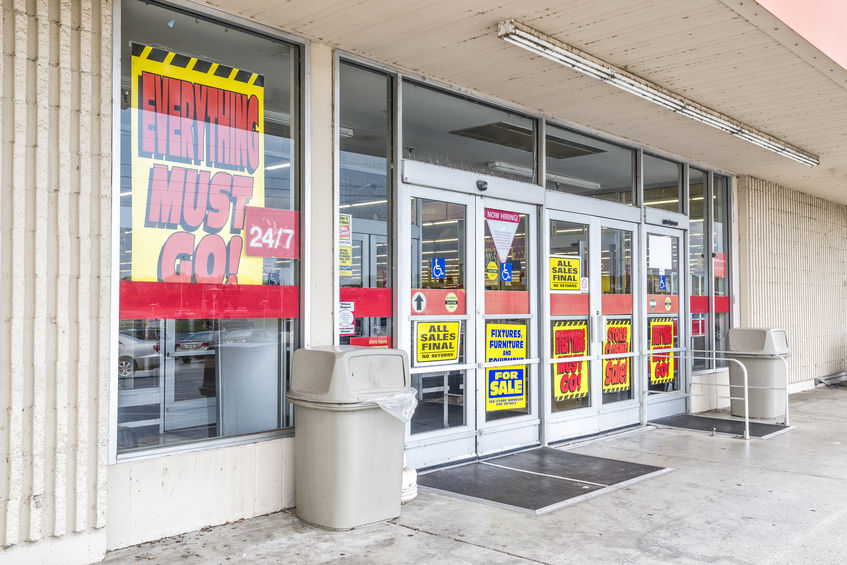Several publicly traded companies have filed for bankruptcy this year. Some names are quite familiar: JCPenney, Gold’s Gym, Neiman Marcus, J.C Crew, Hertz Corporation, and many more.
What happens to the stock when a company files for bankruptcy? Do shareholders get any of their money back?
If you own stock in a company that has filed for bankruptcy, your shares will most likely become worthless. Don’t expect to get any money back. Stock holders are the last in line to recover any assets.
The good news is your loss is limited to your investment.
What happens when a company files for bankruptcy
Bankruptcies are governed by federal bankruptcy laws. The two most common types of bankruptcy are:
- Chapter 7: When a company files under Chapter 7, it is insolvent. It has no money to pay its creditors and continue operations. The business is closed for good. The bankruptcy court will appoint a trustee to liquidate the company’s assets and use the proceeds to pay its debt. Typically, secured creditors are paid first, followed by the general creditors and bond holders. Shareholders are paid last, if there is any money left.
- Chapter 11: When a company files under Chapter 11, there is a chance it may recover. The company requests protection from its creditors until it can get back on its feet. Its goal is to restructure and negotiate with creditors so it can stay in business.
The trustee will appoint a committee consisting of creditors and sometimes stockholders to negotiate with the company.
The company will develop a plan to restructure, how much debt it will pay off, how much debt will be discharged, and any compensation to its shareholders. If the committee accepts the plan, the company presents it to the bankruptcy court, which can accept or reject it.
What can you expect as a shareholder?
Typically, when the company restructures, new stock is issued and old shares are canceled. Creditors receive new shares as part of the negotiated plan.
Sometimes existing shareholders will receive shares in the new company; however, they will be diluted and have no real value.
Can you still trade the stock?
You can still trade the stock after a company files for bankruptcy.
Most likely it will no longer qualify to be listed on the major stock exchanges, such as the NYSE or NASDAQ. Instead, it will trade over-the-counter on the OTC Bulletin Board or OTC Pink (formally known as the pink sheets).
If a company is delisted due to bankruptcy, it will be given a new five-letter ticker symbol with a “Q” as the last letter to let investors know the status of the company. Stocks with “Q” at the end of the ticker symbol are the original shares, not new shares issued since a company filed for bankruptcy.
Be careful! It may be tempting to purchase shares of stock in a company going through Chapter 11 bankruptcy. We’ve seen some big names, and the stock is cheap. It may seem like a great price if they recover. But remember: Even if the company makes a comeback, these old shares do not represent ownership in the restructured company.
The original shares retain the low worth of the old, bankrupt company.
What to do if you have worthless stocks
There may be no market for stock in a company that has filed for bankruptcy. Even though it can trade in the over-the-counter markets, there may be no one to buy it. If you can’t sell it, you may be stuck with a worthless security.
If you own a worthless security, the IRS considers it a capital loss.
But the rules to claim the loss are complicated. You can’t claim a loss just because a stock’s value is less than what you paid for it — you have to actually sell the security for less than what you paid.
So what if there is no market?
The financial institution that holds the security can help. It may be willing to write a letter for you stating the security has become worthless. Or it may be willing to buy it from you for a fee. Call or check the institution’s website for information on its process and any applicable fees.
The IRS also considers abandoned securities worthless. To abandon a security, you have to permanently give up all rights and claims to it and not receive any compensation for it.
Consult with your tax advisor on how to handle and report a loss of a worthless security.
How to reduce your risk
The best way to reduce your risk exposure due to bankruptcy is through diversification. Don’t put all your eggs in one basket.
Your stock portfolio should consist of a variety of companies in different industries. If one company or industry takes a major hit, you have other investments to minimize the loss and continue to grow the portfolio.
Sing up for my newsletter to receive future articles

